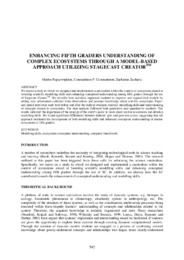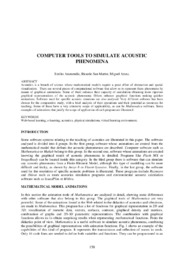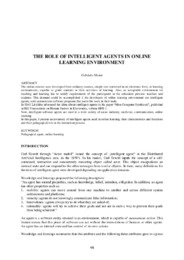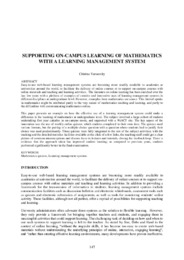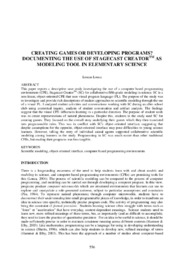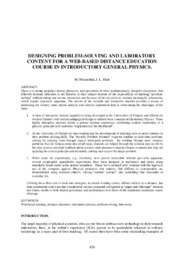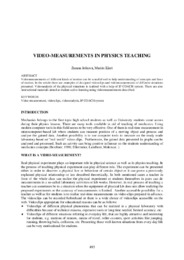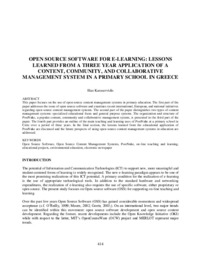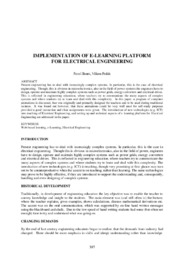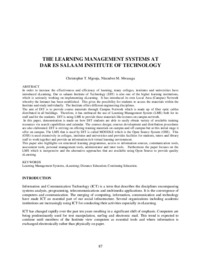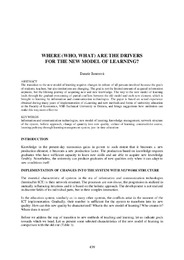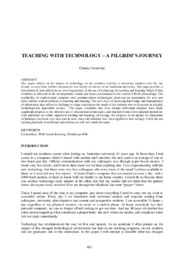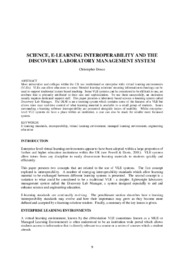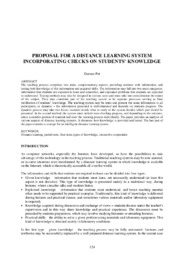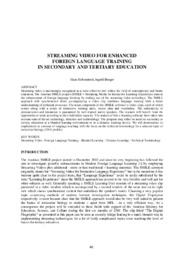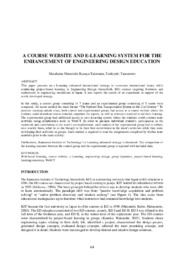Πλοήγηση CBLIS Conference Proceedings 2005 Integrating New Technologies in Science and Education ανά ημερομηνία δημοσίευσης
Αποτελέσματα 1-20 από 62
-
Enhancing fifth graders understanding of complex ecosystems through a model-based approach utilizing stagecast creator
(University of Zilina, 2005)We report a study in which we designed and implemented a curriculum within the context of ecosystems aimed at fostering scientific modelling skills and enhancing conceptual understanding among fifth graders through the use ... -
Developing research-based technology-enhanced curriculum materials: an example in the context of decision-making skills
(University of Zilina, 2005)This study describes the design of web-based learning materials for the development of decision-making skills in energy-based issues. First, we provide an overview of the curriculum development methodology we used and then ... -
Computer tools to simulate acoustic phenomena
(University of Zilina, 2005)Acoustics is a branch of science whose mathematical models require a great effort of abstraction and spatial visualization. There are several pieces of computational software that allow us to represent these phenomena by ... -
The role of intelligent agents in online learning environment
(University of Zilina, 2005)The online courses were developed from ordinary courses, simple text converted in an electronic form, to learning environments, capable to guide students in their activities of learning. Also, an acceptable environment for ... -
Supporting on-Campus Learning of Mathematics with a Learning Management System
(University of Zilina, 2005)Easy-to-use web-based learning management systems are becoming more readily available to academics at universities around the world, to facilitate the delivery of online courses or to support on-campus courses with online ... -
Creating games or developing programs? Documenting the use of stagecast creator as modeling tool in elementary science
(University of Zilina, 2005)This paper reports a descriptive case study investigating the use of a computer-based programming environment (CPE), Stagecast CreatorTM (SC) for collaborative fifth grade modeling in science. SC is a non-linear, object-oriented ... -
Designing problem-solving and laboratory content for a web-based distance education course in introductory general physics
(University of Zilina, 2005)There is a strong prejudice among physicists, and specialists in other mathematically intensive disciplines, that effective distance education is not feasible in their subject because of the impossibility of teaching ... -
Video-measurements in physics teaching
(University of Zilina, 2005)Videomeasurements of different kinds of motion can be a useful tool to help understanding of concepts and laws of motion. In the article there are examples of designed videoclips and videomeasurements of different situations ... -
Open source software for e-learning: lessons learned from a three year application of a content, community, and collaborative management system in a primary school in greece
(University of Zilina, 2005)This paper focuses on the use of open source content management systems in primary education. The first part of the paper addresses the issue of open source software and examines recent international, European, and national ... -
Implementation of e-learning platform for electrical engineering
(University of Zilina, 2005)Present engineering has to deal with increasingly complex systems. In particular, this is the case of electrical engineering. Though, this is obvious in microelectronics, also in the field of power systems the engineers ... -
The Learning Management Systems At Dar Es Salaam Institute Of Technology
(University of Zilina, 2005)In order to increase the effectiveness and efficiency of learning, many colleges, institutes and universities have introduced eLearning. Dar es salaam Institute of Technology (DIT) is also one of the higher learning ... -
Where (who, what) are the drivers for the new model of learning?
(University of Zilina, 2005)The transition to the new model of learning requires changes in culture of all persons involved because the goals of students, teachers, but also institutions are changing. The goal is not the limited amount of acquired ... -
Webquest – activity for internet based learning
(University of Zilina, 2005)WebQuest is one of the effective methods of using ICT tools in the process of learning. It is an activity dedicated to making significant use of WWW resources. WebQuest idea derives from Bernie Dodgie, of San Diego State ... -
Distant and computer-assistant education in rgotups
(University of Zilina, 2005)Specifics of education in our university: most of the students are taking correspondence and moonlighting courses, a vast educational area – more than 30 towns of European Russia, - made e-learning technologies extremely ... -
Teaching with technology – a pilgrim’s journey
(University of Zilina, 2005)This paper reflects on the impact of technology on the academic activity of university teachers over the last decade, as seen from within a department in a faculty of science of an Australian university. The paper provides ... -
Science, e-learning interoperability and the discovery laboratory management system
(University of Zilina, 2005)Most universities and colleges within the UK use institutional or enterprise wide virtual learning environments (VLEs). VLEs can allow educators to create 'blended learning solutions' meaning information technology can be ... -
Distributed system for the acquisition of skills in java programming
(University of Zilina, 2005)This contribution describes briefly a distributed application, which main aim is to support testing procedures of students’ during their Java programming skills acquisition and to introduce them interactively into the ... -
Proposal for a Distance Learning System Incorporating Checks on Students’ Knowledge
(University of Zilina, 2005)The teaching process comprises two main, complementary aspects: providing students with information, and testing both knowledge of this information and acquired skills. The information may fall into two main categories: ... -
Streaming Video For Enhanced Foreign Language Training In Secondary And Tertiary Education
(University of Zilina, 2005)Streaming video is increasingly recognized as a most effective tool within the field of contemporary and future education. The Austrian SMILE project (SMILE = Streaming Media for Interactive Learning Experience) aims at ... -
A course website and e-learning system for the enhancement of engineering design education
(University of Zilina, 2005)This paper presents an e-Learning enhanced instructional strategy to overcome instructional issues while conducting project-based learning in Engineering Design (henceforth, ED) courses targeting freshmen and sophomores ...
